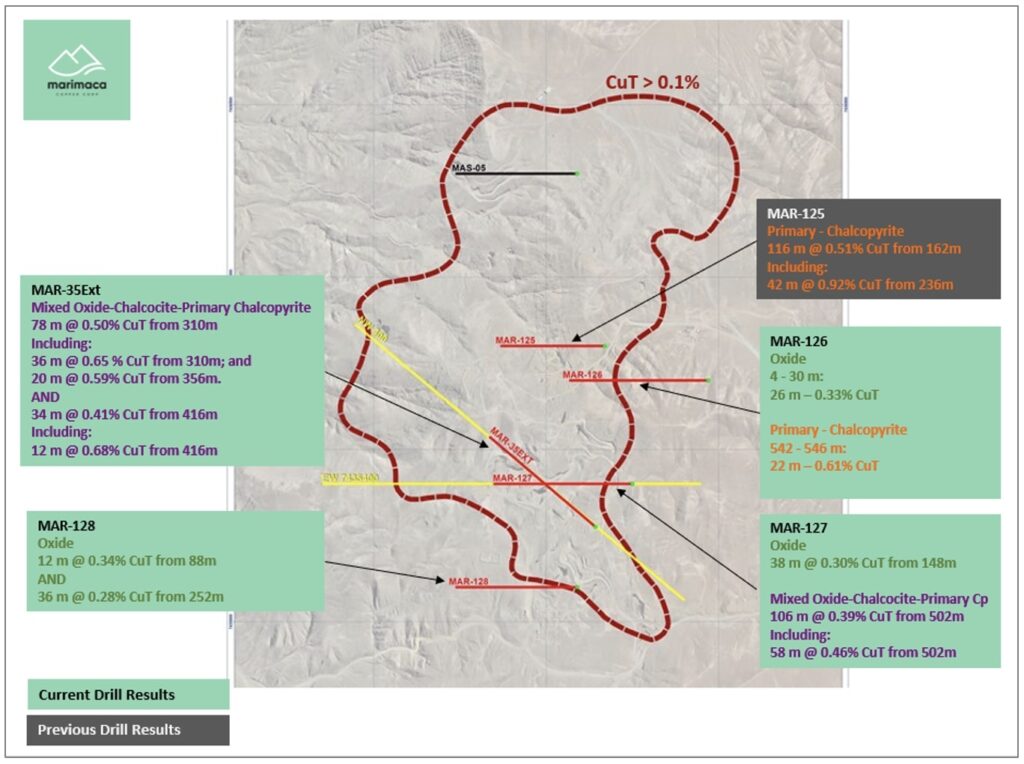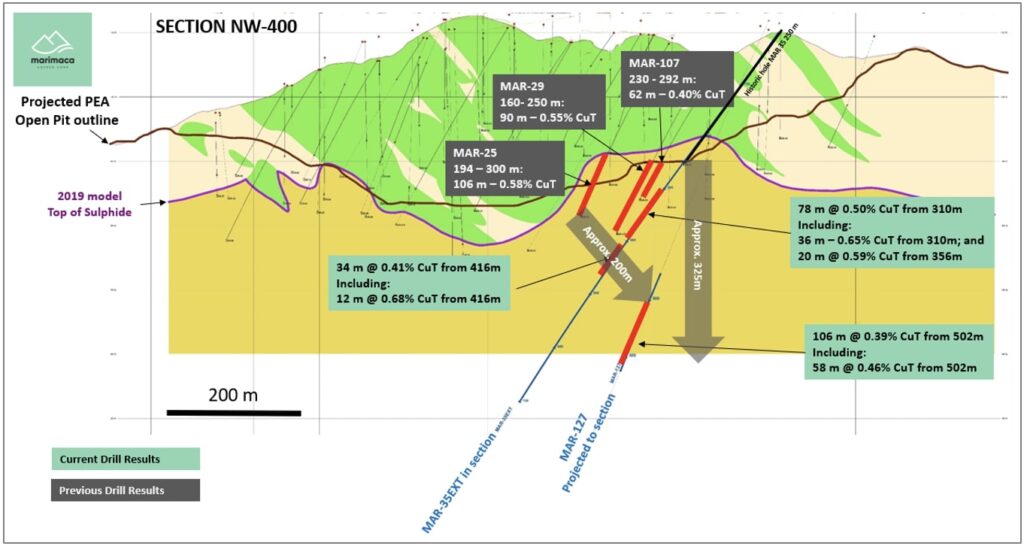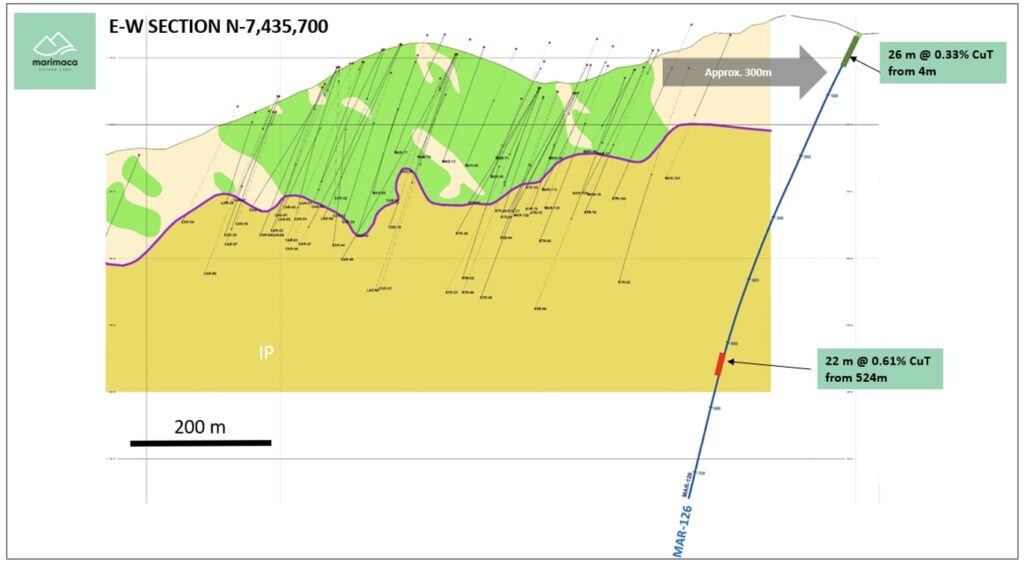Marimaca’s Drilling Delivers Significant Extensions to Oxide Deposit
May 5, 2021
Vancouver, British Columbia, May 5, 2021 – Marimaca Copper Corp. (“Marimaca Copper” or the “Company”) (TSX: MARI) is pleased to announce the results from the remaining drill holes completed to test the extensions of mineralization below the Marimaca Oxide Deposit (“MOD”), which have yielded promising results that may have positive implications for the future leachable Mineral Resource Estimate (“MRE”) for the MOD. These initial drill holes were aimed to test the extensions of mineralization below the MOD. Drilling of a nine-hole program at the Cindy Target has commenced, infrastructure preparation is underway at Mercedes and Robles and the Company remains on track to test all targets by the end of H1 2021.
Highlights
- Significant down dip and along strike extensions to mixed oxide-secondary sulphide mineralization immediately below the limits of the PEA defined open pit
- Mar-127 intersected:
- 38m @ 0.30% CuT from 148m, extending and broadening the lower-grade oxide halo around the MOD
- 106m @ 0.39% CuT from 502m (incl. 58m @ 0.46% CuT from 502m) of mixed oxide and secondary sulphides
- Mar-35 Extension, designed to confirm and extend the results from MAR-127, intersected:
- 78m @ 0.50% CuT from 310m of mixed oxide and secondary sulphides
- 34m @ 0.41% CuT from 416m of mixed oxide and secondary sulphides
- Sequential copper analysis of all samples is currently underway which will provide an indication of leaching potential and potential metallurgical recoveries via heap leach
- Phase 4 met testing program previously indicated strong recoveries in the mixed mineralization zones tested
- Mar-127 intersected:
Sergio Rivera, VP Exploration of Marimaca Copper, commented:
“These results indicate that the oxide / mixed mineralization zone of the MOD is not closed off and, in fact, extends quite significantly at depth and along strike, presenting an opportunity to materially increase the size of the leachable resource for the MOD.
“The mineralization intersected in the current drilling is predominantly mixed oxide and secondary sulphide with minor chalcopyrite. We are currently completing full sequential copper analysis to define the leaching potential of this material.”
Luis Tondo, Chief Operating Officer of Marimaca Copper, commented:
“The results of our Phase 4 metallurgical test work program indicate that mixed and enriched mineralization can leach very effectively. As a result, we are excited at the potential of these results to eventually become part of a mine plan for the MOD. This will, of course, be dependent on the leaching potential of the material, which we will understand better once we have received the sequential copper analysis.
“If this material is leachable, with recoveries similar to the results achieved in our metallurgical testing, it may provide an opportunity to increase the scale of production for the MOD. We are currently completing a detailed options study to define the basis of design for the upcoming Feasibility Study for the MOD and we will incorporate the potential for increasing the scale of the project into our decision-making process.”
Discussion of Campaign Objectives and Results
The Company completed a five-hole drilling campaign at the Marimaca Copper Project, which was designed to test for extensions to mineralization below the MOD. Based on the structural controls of the mineralization, the results of previous geophysical campaigns and earlier drilling, which extended beyond the current Mineral Resource Estimate (“MRE”) area, the Company believes there is the potential for extensions of the mineralized body at depth across the full strike length of the MOD. All drill holes were planned to be drilled with an azimuth of 270o and at -60o, roughly perpendicular to the north-south striking, easterly dipping mineralizing structures. Intercepts should, therefore, be relatively close to the true width of the mineralization.

MAR-127 and MAR-35-EXT
MAR-127 is located approximately 400m to the south of MAR-125, the first drill hole of the campaign (refer to press release of 7 April 2021), and was designed to test extensions at depth and along strike. It intersected two zones of copper mineralization, the first of which was shallow, dominantly green oxides over a downhole width of 38m with an average grade of 0.30% CuT. Although relatively lower-grade than the MOD, this would be considered an infill drill hole and the widths and grades intersected were above what has been estimated in this area by the block model used in the MOD MRE.
The second intersection was deeper and is believed to represent a material downdip extension of the known mixed mineralization zones. It intersected 106m of mixed oxide, secondary and minor primary sulphide mineralization with an average grade of 0.39% CuT, including 58m at 0.46% CuT, starting from 502m downhole.

MAR-35-EXT is the continuation, at depth, of a previous drill hole and was drilled with the aim of testing the continuity of the mixed mineralization intersected in MAR-127. The results were, once again, very positive with two broad zones of mixed oxide, secondary and primary sulphide mineralization intersected up dip from MAR-127. Results included 78m with an average grade of 0.50% CuT from 310m and 34m with an average grade of 0.41% CuT from 416m, for over 100m of copper mineralization. Both drill holes encountered what is believed to be the downdip extension of mixed copper mineralization encountered in previous drilling. These drill holes include MAR-25 which intersected 106m at 0.58% CuT, MAR-29 with 90m at 0.55% CuT and MAR-107 with 62m at 0.40% CuT. The majority of these mineralized zones were not captured in the Preliminary Economic Assessment (“PEA”) mine plan.
The Company will examine all of these drill holes, with respect to sequential copper analysis and the expected favourable metallurgical response achieved for the mixed zones of mineralization in the Phase 4 metallurgical program (refer to press release of 8 September 2020), to ascertain whether this material may form part of an upgraded MRE and future mine plans for the Project.
MAR-126
MAR-126 is located on the eastern margin of the MRE and was designed to test for extensions of mineralization at depth. It provided a significant amount of information with respect to the geological model for Marimaca and intersected a zone of oxide mineralization from surface (26m with an average grade of 0.33% CuT), providing evidence for a material broadening of the lower-grade halo around the current MOD MRE.
At depth, the drill hole intersected several narrower zones of primary copper sulphide including 22m with an average grade of 0.61% CuT from 524m downhole. These intersections, and the orientations of the structures observed in drilling, remain consistent with the magnetic anomaly that dips to the east (refer to press release of 23 September 2020).

MAR-128
MAR-128 is located approximately 700m to the south of MAR-125, the first drill hole of the campaign (refer to press release of 7 April 2021), and was designed to test the southernmost limits of the MOD. Once again, drilling encountered oxide mineralization, but the mineralization is noted to be thinning, which is consistent with the other drilling on the southernmost extremities of the MOD. Notwithstanding this point, there continues to be potential for minor extensions to both the south and north of the MOD, which could add to overall mine life and will be followed up in future drilling campaigns.
Sampling and Assay Protocol
True widths cannot be determined with the information available at this time. Marimaca Copper RC holes were sampled on a 2m continuous basis, with dry samples riffle split on site and one quarter sent to the Andes Analytical Assay preparation laboratory in Calama and the pulps then sent to the same company laboratory in Santiago for assaying. A second quarter was stored on site for reference. Samples were prepared using the following standard protocol: drying; crushing to better than 85% passing -10#; homogenizing; splitting; pulverizing a 500-700g subsample to 95% passing -150#; and a 125g split of this sent for assaying. All samples were assayed for CuT (total copper), CuS (acid soluble copper) by AAS. A full QA/QC program, involving insertion of appropriate blanks, standards and duplicates was employed with acceptable results. Pulps and sample rejects are stored by Marimaca Copper for future reference.
Qualified Person
The technical information in this news release, including the information that relates to geology, drilling and mineralization was prepared under the supervision of, or has been reviewed by Sergio Rivera, Vice President of Exploration, Marimaca Copper Corp, a geologist with more than 36 years of experience and a member of the Colegio de Geólogos de Chile and of the Institute of Mining Engineers of Chile, and who is the Qualified Person for the purposes of NI 43-101 responsible for the design and execution of the drilling program.
The Qualified Person for content other than geology, drilling and mineralization in this news release is Luis Tondo, Chief Operating Officer of Marimaca Copper, a mining engineer with more than 30 years of experience and a Fellow of The Australasian Institute of Mining and Metallurgy, who is the Qualified Person for the purposes of NI 43-101.
Both QPs confirm they have visited the project area, have reviewed relevant project information, are responsible for the information contained in this news release, and consent to its publication.
Contact Information
For further information please visit www.marimaca.com or contact:
Tavistock
+44 (0) 207 920 3150
Jos Simson/Oliver Lamb / Nick Elwes
Forward Looking Statements
This news release includes certain “forward-looking statements” under applicable Canadian securities legislation. There can be no assurance that such statements will prove to be accurate, and actual results and future events could differ materially from those anticipated in such statements. Forward-looking statements reflect the beliefs, opinions and projections on the date the statements are made and are based upon a number of assumptions and estimates that, while considered reasonable by Marimaca Copper, are inherently subject to significant business, economic, competitive, political and social uncertainties and contingencies. Many factors, both known and unknown, could cause actual results, performance or achievements to be materially different from the results, performance or achievements that are or may be expressed or implied by such forward-looking statements and the parties have made assumptions and estimates based on or related to many of these factors. Such factors include, without limitation: risks related to share price and market conditions, the inherent risks involved in the mining, exploration and development of mineral properties, the uncertainties involved in interpreting drilling results and other geological data, fluctuating metal prices, the possibility of project delays or cost overruns or unanticipated excessive operating costs and expenses, uncertainties related to the necessity of financing, the availability of and costs of financing needed in the future as well as those factors disclosed in the annual information form of the Company dated March 29, 2021, the final short form base prospectus and other filings made by the Company with the Canadian securities regulatory authorities (which may be viewed at www.sedar.com). Accordingly, readers should not place undue reliance on forward-looking statements. Marimaca Copper undertakes no obligation to update publicly or otherwise revise any forward-looking statements contained herein whether as a result of new information or future events or otherwise, except as may be required by law.
Neither the Toronto Stock Exchange nor the Investment Industry Regulatory Organization of Canada accepts responsibility for the adequacy or accuracy of this release.



